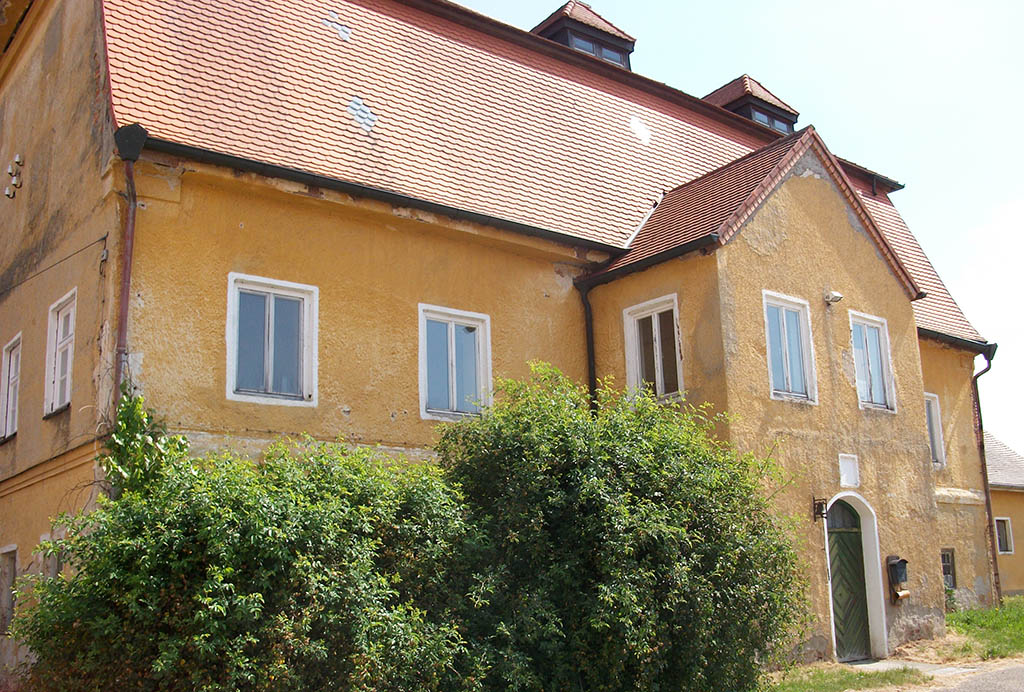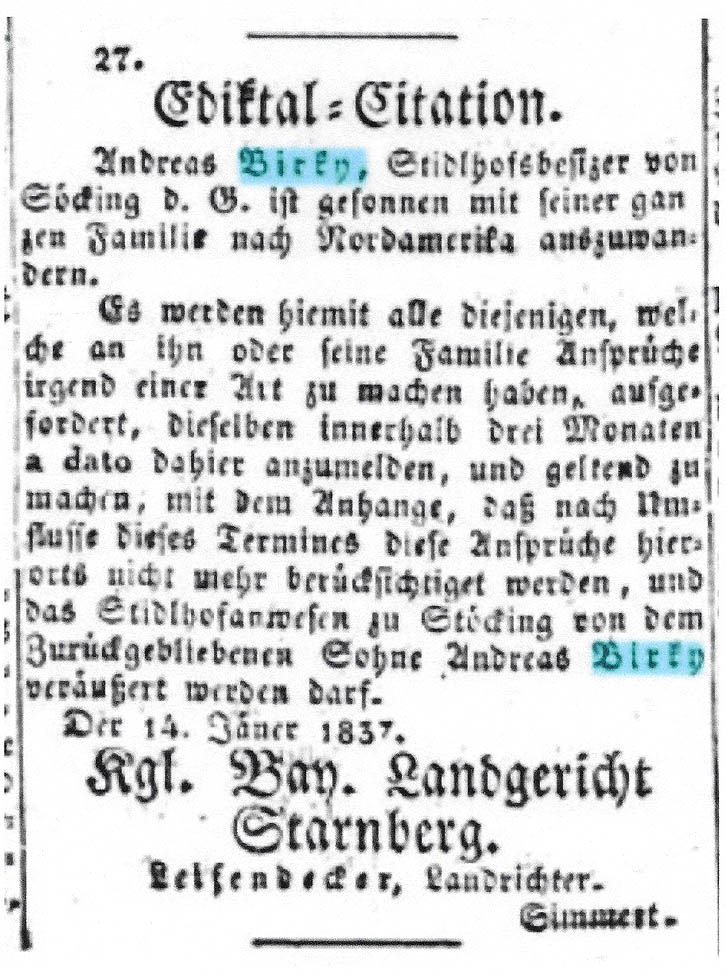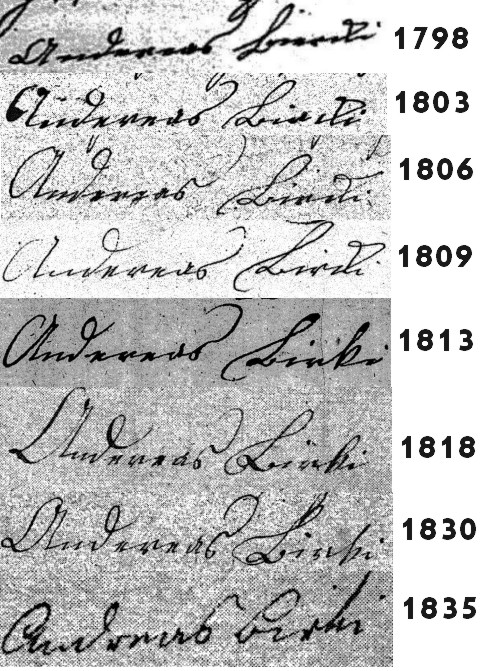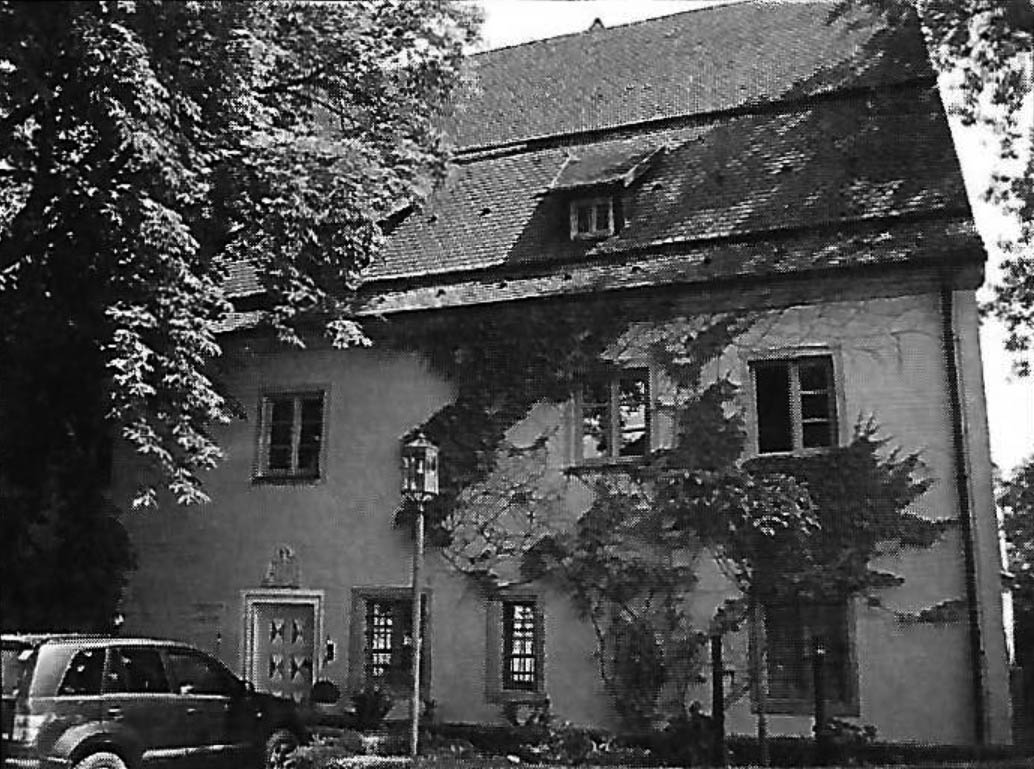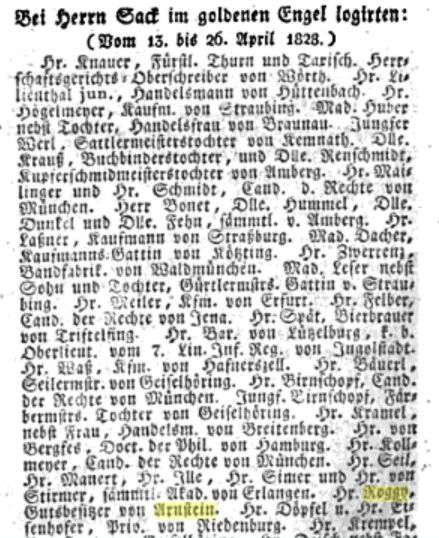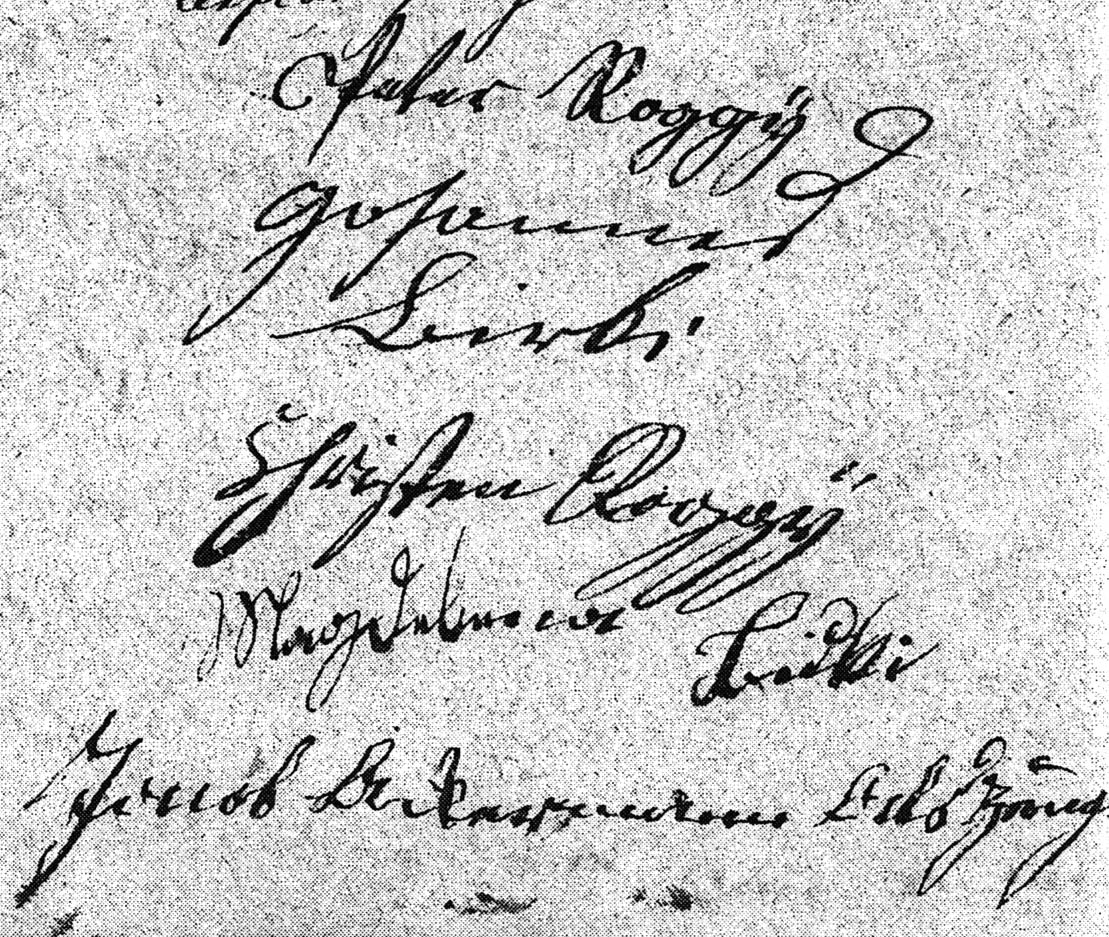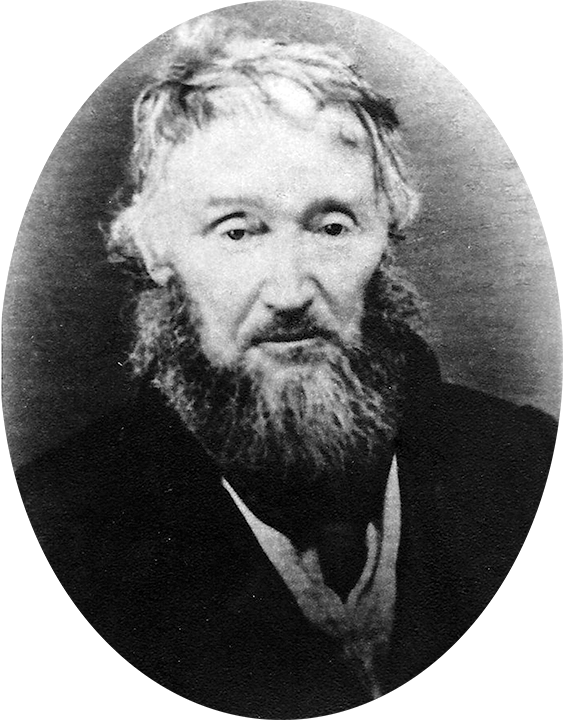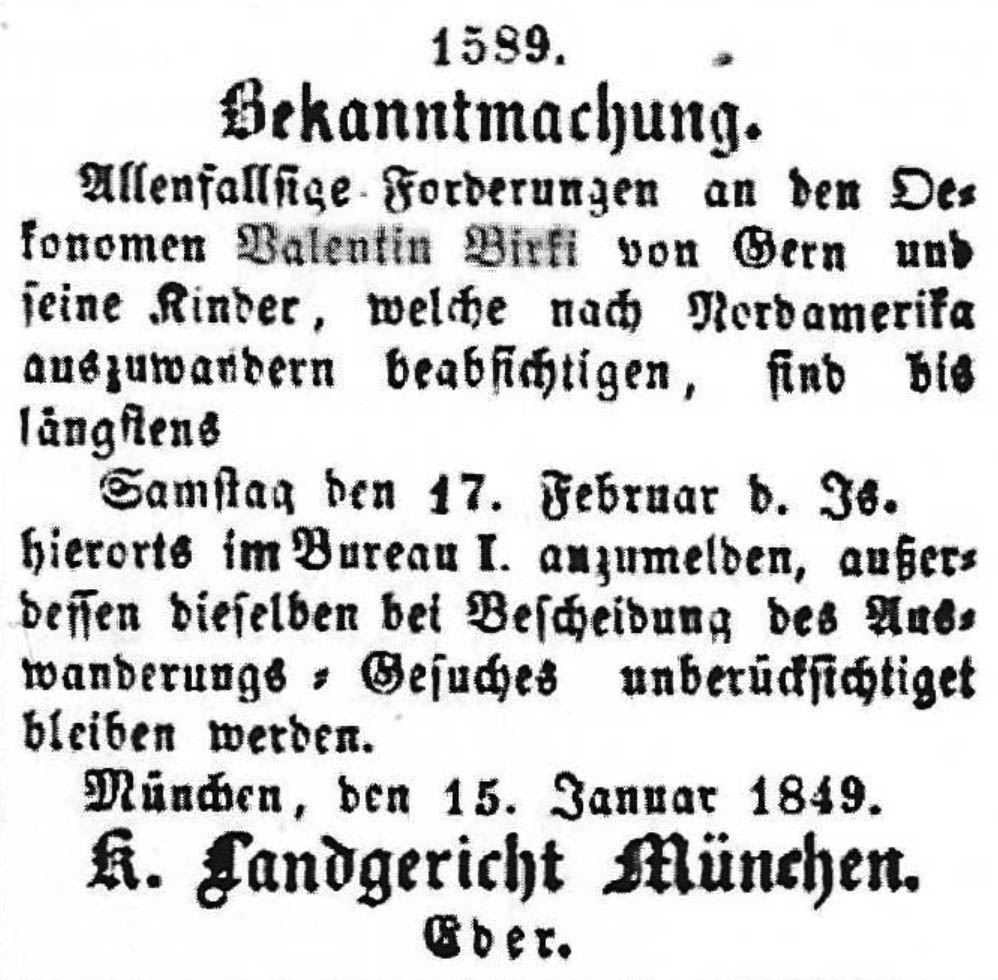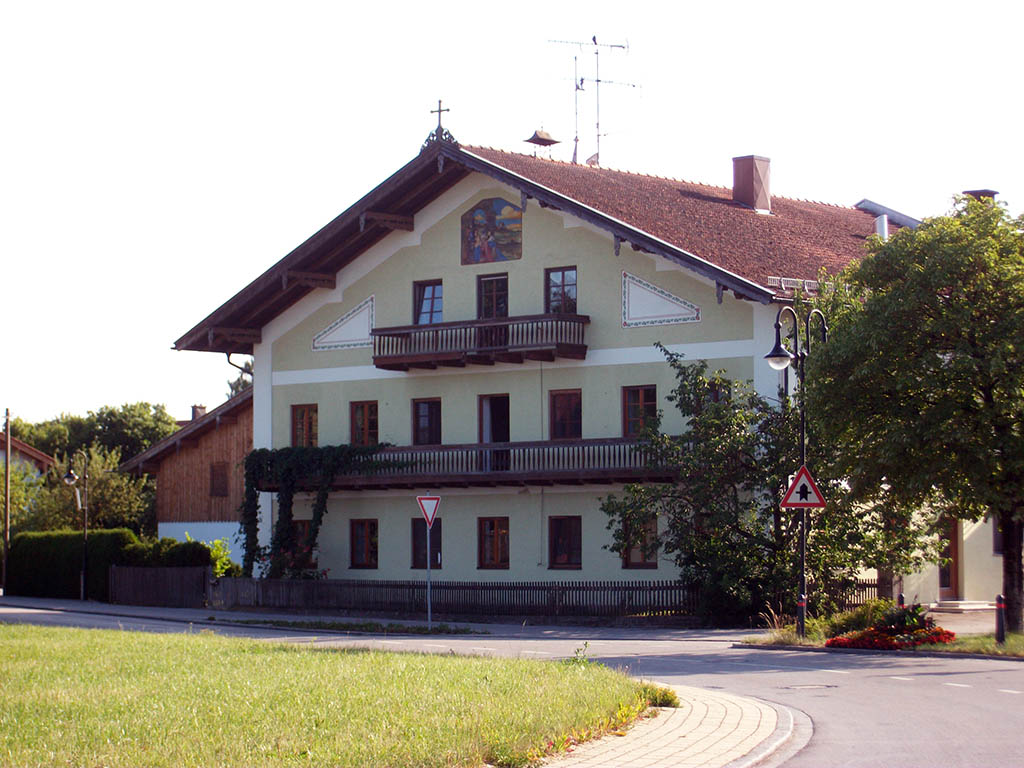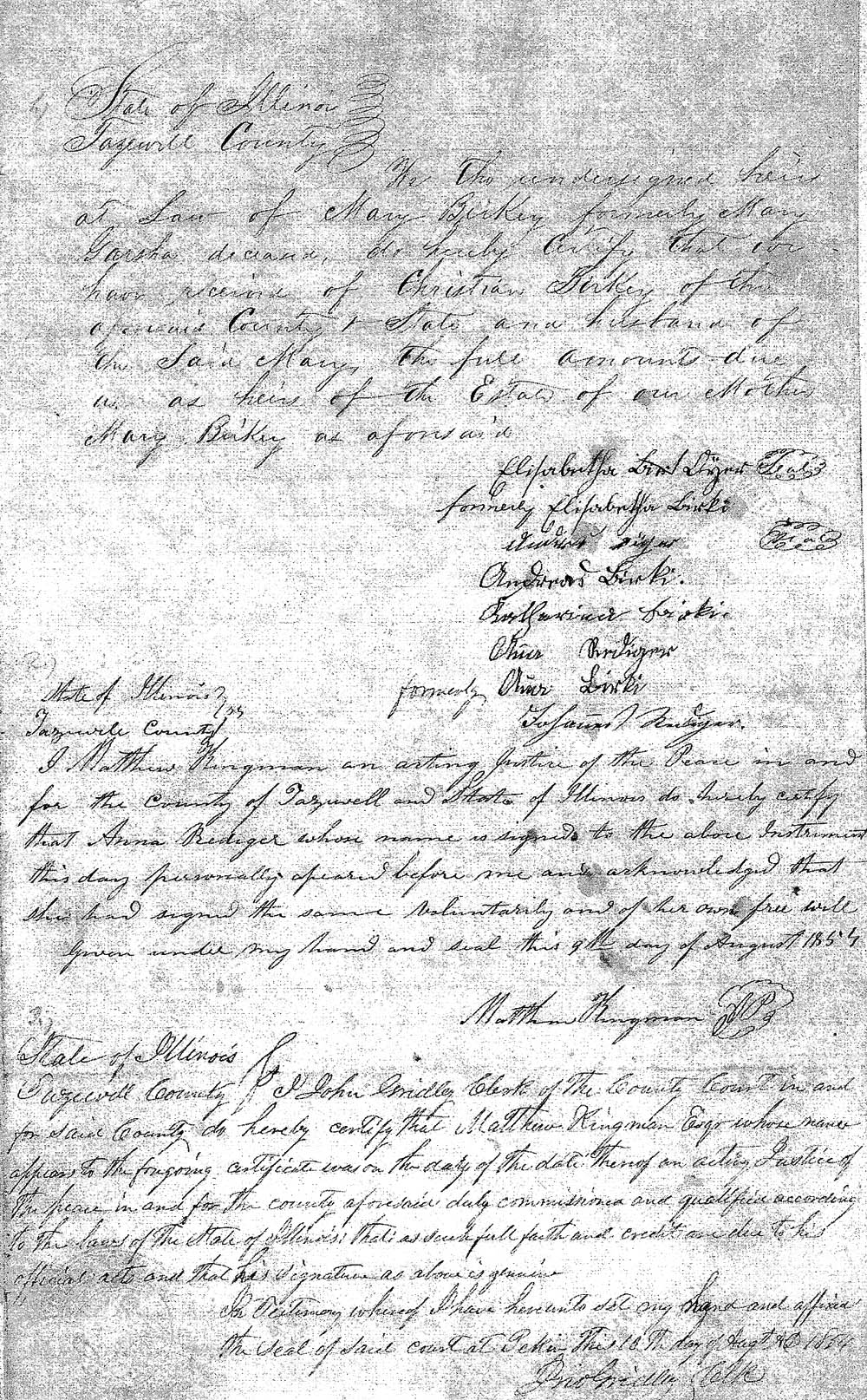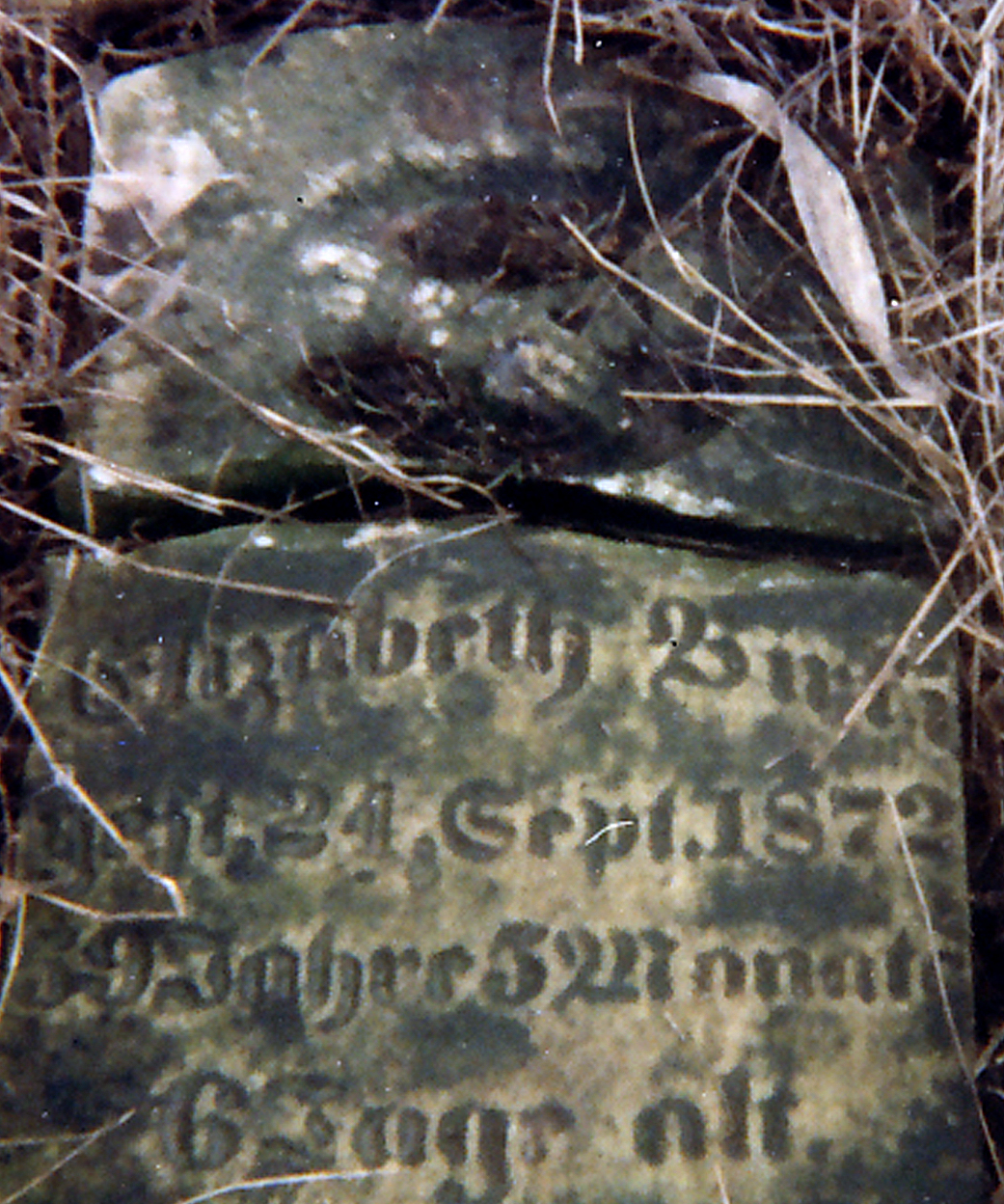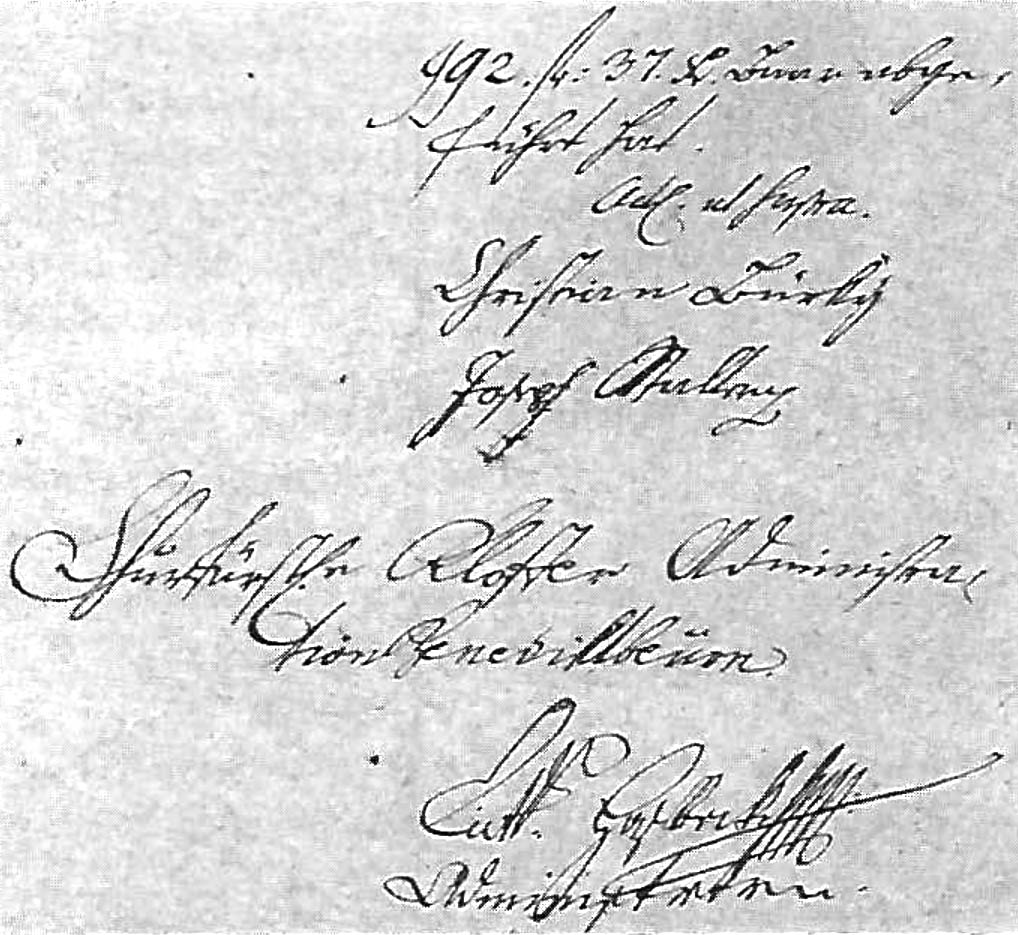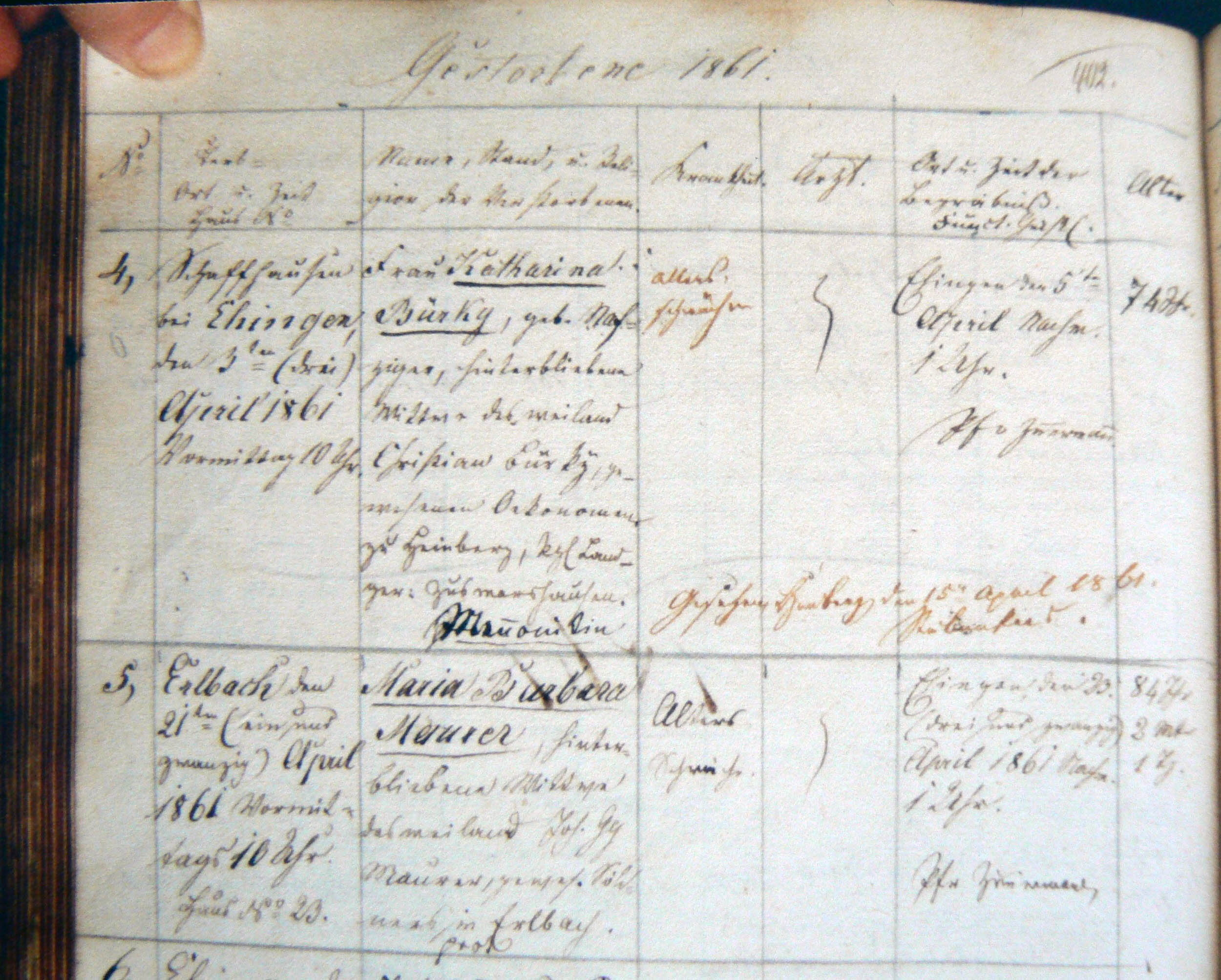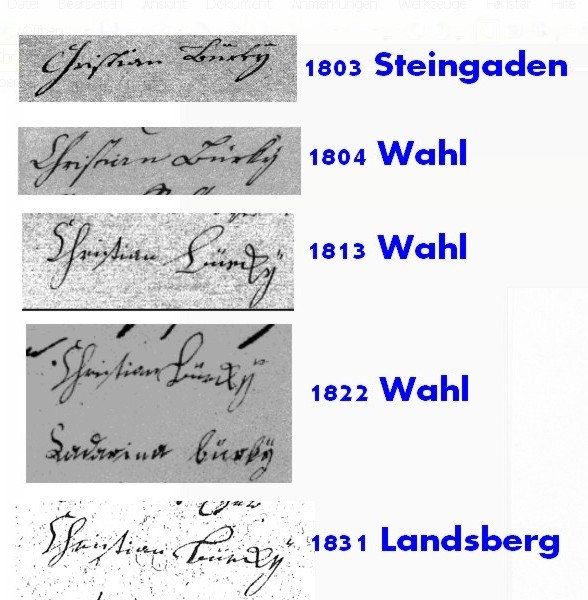The Amish Bircky and Bürcky Families in Bavaria
by Herbert Holly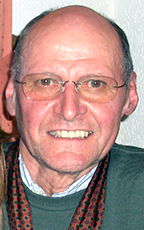 Herbert Holly, [email protected]; lives in Hofolding near Münich, Bavaria, Germany. He is married and has two children. Before he retired, he worked as an underwriter for fire insurance with the Zürich Insurance Group. Since 1973, he has enjoyed studying the Amish Mennonite families from Switzerland, Alsace, Rhineland, Bavaria, and the U.S.
Herbert Holly, [email protected]; lives in Hofolding near Münich, Bavaria, Germany. He is married and has two children. Before he retired, he worked as an underwriter for fire insurance with the Zürich Insurance Group. Since 1973, he has enjoyed studying the Amish Mennonite families from Switzerland, Alsace, Rhineland, Bavaria, and the U.S.
Photo credits: Herbert Holly unless otherwise noted.
The Bircky, Bürcky, and Bircki families originally lived in Oberdiessbach, Canton Bern, Switzerland, where a son named Hans was born to Niclas Bürcki and Anna Holli on January 12, 1673. This is the oldest proof of a Bürcki/Holly connection in Switzerland.
Nymphenburg Palace
Nymphenburg Palace, Schloß Nymphenburg 1, 80638 München, Germany
Dachau
Dachau, 85221, Germany
Steingaden
Steingaden, 86989, Germany
Waal
Waal, 86875, Germany
Landsberg am Lech
Landsberg am Lech, 86899, Germany
Scheyern
Scheyern, 85298, Germany
Flügelsberg
Flügelsberg, 93339 Riedenburg, Germany
Regensburg
Regensburg, Germany
Teublitz
Teublitz, 93158, Germany
The following appears in the Swiss Mannrechtsrodel from Bern:
- January 1, 1700 – Benedikt Bürcki from Trimmstein now in Grißbach/Alsace (Hanau-Lichtenberg)
- June 3, 1710 – Christen Bürcki moved away from Mannrecht
- March 4, 1727 – Nicolaus Bürcki from Höchstetten
- September 19, 1748 – Johannes Bürcki from Herblingen moves to Zweibrücken
Since 1606, the Bürcki and Holly families are documented in the village chronicle, Oberdießbach, History of a Village.
Men from both families administered law from 1606, as can be seen by the crests in Wappen der Gerichs-sässen von 1606. The court cup documenting the family names can still be seen in the museum of Oberdießbach. The crests of the two families are engraved on it with the names of the family member administering law. Other families shown, such as Güngerich, still live in Bavaria to this day. Many families found a new homeland in northern Alsace around Wissembourg (Nehweiler), or near the border of Lorraine in Diemeringen, Rimsdorf, Domfessel, and Saaralbe. Here it was that a man of the Holly family courted a woman from the Bircky clan.
The first known Bircky marriage in Alsace was my great-great-great-great grandfather Georg Holly from Nehwiller in Alsace, deceased in the second year of the French Republic, and Barbara Bircky, deceased in the fourth year of the Republic at the age of 69 years.
There were other marriages between the Holly and Bircky families in the Palatinate. The farmer Christian Holly, born 1770, son of Georg Holly from Nehwiller, lived in Speyer, Jakobgasse 39, with his wife Barbara, neé Bircky. Christian died on June 15, 1800, in Speyer. His father-in-law Christian Bircky witnessed this with his signature. Barbara moved from Speyer to Johannisthaler Hof near Königsbach, where she died on November 26, 1811, at age 50.
A brother of Christian Holly—Georg Holly—lived in Jakobsgasse as well. He died on June 3, 1819, aged 54, the husband of Magdalena Bircky, the sister of Barbara. Here, as well, the father-in-law witnessed the death.
The Secularization in Bavaria – Beginning a New Life
- promised freedom of religion
- granted easement of taxes
- given relief of the duty for military service for the first generation
Many Amish families accepted this invitation, and that is how the families Bircky/Bürcky lived on the estates in Upper Bavaria.
A document shows that on the June 11, 1803, the father of Valentin Bircky from Lutterbach in Alsace received permission from the French state to emigrate to Bavaria. Christian Bürcky, married to Katharina Nafziger, is mentioned as tenant of the “Wahl” estate near Wolfratshausen in 1804. He had also been a tenant in Schwabing (now part of Munich) of Count Gohren. Additional immigrant families included Johannes Bircky from Buscherhof near Rimsdorf/Alsace to Steingaden in 1804, and the Andreas Bircky family from Lutterbach near Diemeringen/Alsace. Andreas was married to Katharina Ackermann and settled on the Flügelsberg farm near Riedenburg. It is also known that Barbara Bircky born ca1748, died on January 24, 1826, aged 78, in Perlach, now part of Munich. She is mentioned as mother of the castle owner Bircky.
Andreas Bircky
The first time we find Andreas Bircky mentioned is in a document concerning the Engelmannsberg estate owned by Count Törring-Jettenbach. A tenancy agreement for 18 years contracted in March 1803.
The size of the farm including fields and meadows was 450 acres. Philipp Eyer was also present at the time and signed the contract as well. There must have been differences later on because the agreement was dissolved three years later. A controversy had arisen about the state of the buildings and the fields. Andreas is supported by Christian Güngerich, tenant of the estate (Gut) Blumenthal near Aichach, and Jakob Dester, tenant of Gut Westerhof. The caretaker and the employees of the Engelmannsbergestate were interviewed about Andreas’ care of the property, but no instances of bad cultivation or management could be found by the consultants. The estate must have been in very bad condition at the beginning of the rental period.
Only three months later, according to the certificate dated December 6, 1806, Andreas buys the Flügelsberg estate near Riedenburg. He bought it for 8,260 Guilders from the Royal Finance Office in Munich. It was 170 acres containing fields and woods. It is mentioned in the contract that Andreas Bircky had been a tenant of Engelmannsberg, which was still owned by Counts Törring – Jettenbach. At those times it belonged to Hofmark Pörnbach.
Thanks to lucky circumstances, I accidentally found something in Hauptstaatsarchiv in Munich which tells us a bit more about the family: “It was on November 3, 1811, that Andreas Bircky, owner of the Meihern farm in the court area of Riedenburg, plans to travel to Zweibrücken in France together with Johannes Bircky, tenant in Maierhofen in the same court area, with his wife Frena and his farmhand Christian Bircky, because of family matters.” It was later mentioned the family also plans on to Saarbockenheim. The passports were granted on November 29, 1811. What family matters needed attention, we do not know.
Andreas farms the Flügelsberg until the end of 1813. On December 29, 1813, he sells it to Vinzenz Kettner, his wife and their heirs and offspring for the price of 4,000 Guilders cash, 3,000 Guilders debt taken over by the buyer, and the necessary taxes.
I also discovered an entry about a birth in the Catholic Church archives in Regensburg:
A+M *18.1.1813 father: Andreas Bircky, Anabaptist on Maierfarm. This is the date of birth of twins. M=Maria and A unknown. This is the last evidence of the stay near Riedenburg.
It is only in 1818 that Andreas and Katharina Bircky appear again. The Sieber Manor House in Perlach, named “Castle Perlachöd,“ is bought on July 1, 1818 for 17,000 Guilders. The estate has a size of 181 acres, five acres herbal gardens near to the farmhouse, 74 acres of woodland, and 23 acres other land, with horses, cows, and sheep.
I found an interesting note about Andreas in the Bavarian Main State Archive, Hauptstaatsarchiv, Munich. Already in 1830, the couple Andreas and Katharina Bircky had sold the farm and dwelling to Heinrich Belliard and Joseph August Jaquier from Dornach near Munich for 19,740 Guilders. On March 22, 1830, Andreas wrote an inventory: “I leave everything behind on my estate at Perlach“. He wanted to emigrate to his son Johann who had already been living in Upper Canada (today Ontario) for a few years. He explains his wish for emigration in a letter to the government in Munich, written September 11, 1830. The following are the most important parts of that letter:
“My family circumstances and especially the fact that my son has been living in York in Upper Canada in America already for ten years influenced me to want to follow him and to emigrate myself. As I am French and did not reach for any rights in Bavaria, there should not be any obstacle to emigrate. I shall not bother the Royal Office further unless there would be a special reason. I worked as a successful farmer in different places and have bought an estate in Perlach in 1818. As I was not of a mind to stay in Bavaria any longer, it was natural to sell my property. But the rest of the selling price is pledged as security at court. There it remains. I ask for release of this money, as approval for my arrival in York in Upper Canada has already been approved by Vice Governor Mitland. I enclose the document. I, therefore, ask you not to delay me further as the ship for my companions and me has already been ordered and will leave in a few days. It would bring me into a difficult and costly situation. In these circumstances, there are no fees deducted anyway. In deepest respect, waiting, with greatest subservience and obedience,
Bircky from Perlach”
The Ministry for Internal Affairs answered this letter on November 30, 1830, saying that Andreas Bircky must pay 10% of the deposit sum as tax. It also asked the Ministry for Foreign Affairs if it agreed with the opinion of the Ministry of Internal Affairs. On November 30, 1830, the judgement was given that Andreas had to secure a replacement for each of his sons who were obligated to take part in military service: Andreas, Jr. born in 1809 and Joseph born in 1811, in accordance with § 67 Law for Military Replacement. As this had not happened, the 10% tax was justified.
So emigration could not take place at the time, as certainly Andreas did not want to leave that much money to the State. He thought of something else. On December 9, 1830, he bought another estate from his co-religionist brother Daniel Zehr, house number 2 in Söcking near Starnberg including 236 acres of land for 6,000 Guilders. The District Court of Munich affirmed to Andreas Bircky that he owned 5,600 Guilders cash.
This is where he stayed until 1835 and from where he organized his emigration. He asked the District Court of Starnberg for passports for himself and his family in order to travel to the parts of Bavaria that are left of the Rhine River—the Palatinate. On March 9, 1835, he sold 111 acres of woods to different farmers. The price is not mentioned in the sales contract. On the way to the boat in Le Havre, he stopped in the Donnersberg area, to visit the notary Christian Julius Jakobi from Canton Ottersberg. Here the Bircky couple gave authority to their son Andreas, Jr. to sell the farm in Söcking, District Court of Starnberg. They confirmed in the document that the son had free hand to sell the farm and could act according to his own free will.
Then the journey to the New World began. They traveled on the ship William J. John to New York, where they arrived on August 6, 1835. The following is noted on the ship´s list:
- Farmer Andrie Burky 57 years
- Catherine 57 years
- Joseph Burky Brewer 24 years
- Marie Burky 22 years
According to the land registry office of Söcking, parcels of land were sold again and again from 1835 onward. Finally, son Andreas Bircky, Jr. sold the remainder of the estate on February 3, 1838, to Carl Gottlieb de Castelli from Augsburg for 3,900 Guilders. It was also in 1838 that Andreas Bircky, Jr. served as one of the witnesses and signed the marriage contract of Castelli.
Barbara Hieser from Arzbach near Dachau had been employed on the estate Perlach. Andreas Bircky, Jr. gave a donation of 600 Guilders for her many years of loyal service. This is proved by a deed of gift dated June 8, 1838.
Andreas Bircky, Sr. proved helpful to Elisabeth Schanz from Frendoferhof/ Oberaltaich, Lower Bavaria, who had asked the ministry for a permission to emigrate together with her children in 1828. Andreas confirmed that this would be the right thing for the family to do in order to ensure a good future, as his own son already had successfully settled in Upper Canada.
When Andreas Bircky, Jr. finally himself asked for permission to emigrate in 1836, the emigration of his parents was looked at again. What we can see from available documents is that Andreas Bircky, Sr. had in fact asked for a passport to the areas left to the Rhine before his emigration. But he never picked it up in Upper Bavaria—he had left the country without it. According to the certificate found, the Bavarian government judged the emigration of Andreas, Sr. and Catharina Bircky as being illegal, since no approval existed. In this case, the children are liable for the parents.
Johannes Bircky
Johannes Bircky is mentioned for the first time in Bavaria in 1803. He had come from Buscherhof in Lorraine, and was married to Veronika Zwalter on February 27, 1798, recorded in the civil records of Gondrexange. A witness was the brother-in-law Gascho. On December 23, 1798, a son named Andre´ was born, who unfortunately died on March 6, 1799. The second child Barbe was born on January 29, 1800.
According to the civil records in Rimsdorf, a son named Johannes was born on September 17, 1801, and another son named Andreas on June 16, 1802. (The couple later had five more children.) The next year Johannes begins his search for a home and farm.
A certificate shows that he and Jacob Eyer together applied for tenancy of the estate “Prüllhof” from the monastery Scheyern near Pfaffenhofen at the Ilm River, Upper Bavaria, on September 26, 1803. Both signed the application. But a tenancy never took place, as the estate was sold for 26,000 Guilders in October 1803.
A fee of 1,600 Guilders was paid for the tenancy. The size of land is mentioned as 373 acres of cultivated land and 299 acres of uncultivated land, totaling 672 acres. Included was the Maierhof and all its buildings. Johannes should pay 1,500 Guilders cash and further 5,386 Guilders by installments as redemption. The contract was presented to the government in Munich for final approval, but the government vetoed it. It announced with a letter dated April 3, 1804, that a tenancy as written must be annulled. The explanation for the early termination of the lease contract was that the estate would be sold to the Meyer brothers from Aargau. A change in ownership usually had no impact on pending lease contracts, so the landlords gave as additional justification that other Anabaptist tenants had illegally sold livestock and fodder before leaving, thus lessening the value of the estate.
The problem was huge. Johannes and his family went to Polling via Landsberg where they stayed in a tavern for four weeks. From there he went to Munich to ask for an audience with the government. The treasurer called on him and spoke about the situation. April 12-14,1804, cancellation of the contract was discussed. The civil servant described Johannes as very well tempered: “….and no loose word escaped his lips.” Another civil servant also spoke about tenancy of the estate Schildschwaig estate near Rottenbuch as an alternative. But on April 28, a letter arrived from Munich telling Johannes that he and his people could stay in Steingaden if they would be modest and behave well. The negotiations continued until July 1804.
Johannes brought other families with him and allowed them to be sub-tenants. Their cases were heard by the government as well. Their speaker, Friedrich Hage, signed a form in July 1804 saying that these families would leave together with the main tenant, Johannes Bircky, when the tenancy contract ended.
At the end of April 1804, Johannes also took over the tenancy of the Schildschwaig estate. The previous tenant had been Jakob Eyer, with whom Johannes had previously intended to rent the Prüllhof estate in September of 1803.
The Schildschwaig estate was quite run down, although it had 320 acres of farmland and 310 acres of meadow. A rent of 1,600 Guilders per year was due twice a year on “Lichtmess” (Candlemas, February 2) and “Martini” (Martinmas, November 11).
The next documented residence was Maierhof at Hemau, near Riedenburg. Johannes is mentioned as former tenant in a sales contract from Hellerhof in Obersanding near Regensburg in 1817. From that we know Johannes and his family moved as tenants from Schwildschwaig to castle estate Maierhofen near Hemau. Nearby was his brother Andreas with his family, living on Flügelsberg near Prunn/Brunn. Johannes traveled to France with brothers Andreas and Christian in 1811, as we will describe when we write about Andreas’ life.
Not until September 28, 1826, did Johannes get the final contract to purchase Hellerhof for 5,084 Guilders. A controversy with Baron Berheim from Nieder-Traubling had delayed documentation in the land register.
Preparations for the 1828 marriage contract between Johannes’ daughter Magdalena and Peter Roggy from Armstorf, District Court Wasserburg, are also documented. Peter Roggy was the son of Christian Roggy who had taken lease of the castle Armsdorf estate in 1822.
It is very interesting to read documents reporting all that was done for the marriage of Magdalena Bircky and Peter Roggy. The time frame stretched over three months from April 1828 to the wedding date in July 1828. It shows how marriages were managed at those times, and I think that this was the way of all families, not only Anabaptist families.
- April 13-26,1828, Christian Roggy, the tenant of Armsdorf castle estate and father of the groom, stayed in the guesthouse “Zum Goldenen Engel” (at the sign of the Golden Angel) in Regensburg.
- On April 22,1828, a contract of co-partnership was agreed between Peter Roggy and Johannes Bircky at Patrimonial Court Köfering (Patrimonial is the most local court of the system in Bavaria in the 1800s).* Johannes Bircky announces that he has a lot of debt on Hellerhof in Obersanding and therefore is willing to give (in order to make the management of the farm easier) his daughter Magdalena as wife to Peter Roggy, who also is present. Both Johannes Bircky and Peter Roggy want to manage the farm together and both will share all debts as well as all income. A book in which income and outgoing payments are to be written will be kept. Peter Roggy is bringing 400 Guilders into the marriage. This will be immediately used to pay part of the debt. If the marriage should be canceled, Peter Roggy would get his 400 Guilders back. If the farm is sold, Peter Roggy and Johannes Bircky are to receive the same amount of money. Jakob Ackermann from Eglofsheim, who is also present, agrees to bring several men of Mennonite religion to court very soon, men who will obligate themselves to guarantee this.
May 12, 1828: The elders of the Amish Mennonite community of Regensburg confirm in a letter signed by Christian Güngerich, leader of the Amish religious community, and Jakob Ackermann and Joseph Schantz of parish Obersanding, that the community of Amish shall support the engaged couple in case of need, that they would be given shelter and food and therefore would not be a burden to the general public.
May 16, 1828: On this day, it is reported to District Court Stadtamhof that the guarantee of the afore-mentioned members of the Amish Mennonite religion concerning the marriage of Bircky and Roggy has arrived.
May 22, 1828: The District Court Stadtamhof requests the patrimonial Court Köfering demand a certificate be brought proving Peter Roggy has fulfilled military service, as Mennonites have the duty to serve the military like everybody. Simon Gugenberger, principal of the borough, and church warden Kaspar Scherer sign that they have no oppositions to the marriage of Magdalena Bircky and Peter Roggy, as well as to the naturalization of Peter Roggy (from Peter’s former residence in France to Bavaria).
July 19, 1828: Johannes Bircky, owner of Hellerhof in Obersanding, agrees with Peter Roggy from Armsdorf to the prepared contract of co–partnership from April 22, 1828, and they sign in the presence of Peter Roggy´s father, Christian Roggy. Johannes Bircky gives his daughter Magdalena to Peter Roggy for his wife, and contracts with both an agreement concerning the management of the farm: they will live together in one house, therefore they are one family, and they will share expenses and income equally. If the contract would be absolved, Peter Roggy would get back the 400 Guilders he brought to the marriage. Signed: Peter Roggy, Johannes Bircky, Christian Roggy, Magdalena Birki, Jakob Ackermann as witness.
At the acquisition of Hellerhof, there is a certificate dated September 15, 1835, with the name of the clerk and auctioneer Wolfgang Riedl who handled the purchase. At the sale auction of Hellerhof four years later, on September 10, 1839, it is written again that Johannes Bircky gave authority to the clerk and auctioneer Wolfgang Riedl on August 20, 1836, to sell the farm.
When the estate was split up and sold, the date July 25, 1836, appears several times. From that day, different pieces of farmland were already in the hands of the individual buyers. Fourteen people bought the lands of Hellerhof. The total revenue was 5,906.24 Guilders. We do not know how Johannas and his family received this money—whether perhaps auctioneer Riedl gave them part of money in advance—we have no idea. I looked for the juridical contract between Johannes Bircky and Wolfgang Riedl in various papers of the Court Regensburg (Satdtamhof, Köfering and Gebelkofen) concerning that time, but unfortunately, I found nothing.
“Here appears, Valentin Bircky from Lutterbach in Alsace, 34 years old, father of seven children, five boys and two girls, the oldest 13 years of age, the youngest two years of age, asking for permission to emigrate.”
He backs this petition by the following reasons:
- According to his certified French passport, his parents received permission to emigrate from France on June 11, 1803.
- Since then, he lived on a rented farm in the area of County Court Munich as well as with his brother [Andreas] in the area of Country Court Riedenburg (Flügelsberg).
- His worth adds up to 3,500 Guilders from which he has already paid 2,700 Guilders to his brother Christian Bircky for the farm in Arzbach nearby Dachau. The rest of his property exists at the estate Unterweilbach in form of livestock, equipment, and stored animal feed, which he and his landlord together evaluate as approximately 800 Guilders.
Around 1812/1813, Valentin Bircky married Elisabeth Hunzicker, born in Baierthal near Wiesloch and Heidelberg, and whose parents lived in Gern near Munich. Elisabeth was a step-daughter of Jakob Stalter, the second husband of her mother Magdalena Nafziger. An 1832 certificate of delivery of property records that 2,500 Guilders were given to the bride and groom on the occasion of their wedding. From 1815 on, Valentin rented the castle farm of Court Spreti in Unterweilbach near Dachau. Other fellow Amish Mennonites lived and worked there at the time, as well as workmen or sub-tenants, with names like Oesch, Jordy, Nafziger, Augustin, the (possible) brother or cousin of Elisabeth, Christian Hunzicker, and other relatives.
Valentin and his family stayed at Unterweilbach until 1828. Some of the children mentioned in the list of the attachment were born there. In 1825, Valentin bought an estate in Arzbach near Dachau from his brother Christian Bircky.
This was confirmed in writing sometime after May 31, 1828. It says:
“Christian Bircky passes the right of property of the above mentioned half-farm estate [Arzbach], which until now and still on February 2, 1829, is rented by his brother-in-law Heinrich Ackermann, to his brother Valentin, who as former French subject received the permission to immigrate today.”
The farm included 76 and four-tenth day’s work of farmland, and Valentin paid 3,000 Guilders for it. He also had found a place to live outside of the borough Röhrmoos that Arzbach belonged to, since Christian did not own any other place.
For three years both brothers and their families lived and worked in Arzbach. The reason why Valentin again decided to sell the farm again remains unclear. We found a contract dated April 26, 1831, stating that Valentin and Elisabeth sold the farm to Daniel and Barbara Zehr from Söcking of Country Court Starnberg. The price for the same size of land as when Valentin bought it was 3,000 Guilders. Two thousand Guilders had to be paid on Candlemas 1832. (Candlemas in February has over the years been a great holiday for farmers because that was when the annual rent was due.) The contract states,
“The venders [sellers] will go to the estate of Valentin Bircky´s father-in-law in Gern, Country Court Munich, where they will settle.”
In 1836, a census of the Mennonite community of Munich was registered, and Joseph Stalter, the bishop of the community, listed all families and their places of residence.
- In Nyphenburg, near Munich, lived Georg Hunzicker, widower with two daughters and one son in house number 36.
- In the cadastral land and tax register of 1831 for Gern, one can read that Jakob Stalter is the owner of the Kandlerhof estate, house number 3.
- In a bill of sale from March 8, 1833, it is written that Valentin and Elisabeth get the farm transferred, including 249 day’s work of farmland. This document mentions that at the time Elisabeth is a stepdaughter of “Jakob Stalter, landowner at Gern, house number 3 and his wife Magdalena, born Nafziger, contract with son-in-law Valentin Bircky and his wife Elisabeth, born Hunzicker following transfer….”
Everything was settled the way it was common at those days. Only one specialty is noted:
“The son-in-law must pay 8,140 Guilders extra to Jakob and Magdalena Stalter.”
The decision of the court states there was no objections as Valentin had been living in the Country Court Dachau earlier and had previously asked for the right to live in the Bavarian Kingdom. We assume that the farming was successful because on April 15, 1841, Elisabeth and Valentin Bircky bought the Mayerhof house number 8, the so-called “Wurzer estate” in Ludwigsfeld near Munich, with 27 day’s work of land for 3,251 Guilders. [Ludwigsfeld is also near Dachau.]Many things happened in 1842:
- On February 12, 1842, Georg Hunzicker, a widower, 77 years old, died. He probably was an uncle of Elisabeth. He was buried near the farm in Gern.
- In the same year, Elisabeth and Valentin said good-bye to their third son Christian, born in 1819, who planned to emigrate to America together with the Stalter family. He was engaged to Maria, daughter of Heinrich Stalter. According to the petition for passports dated June 17, 1842, Christian and Maria already had children together. They had been married in 1838.
- On September 2, 1842, Elisabeth and Valentin passed the farm to the eldest son Jakob on the occasion of his marriage to Veronika Hage from Karlskron, Court Neuburg a.d. Donau (at the Danube). The conditions were: the mortgage of 500 Guilders is taken over by son Jakob, who must also pay 1,125 Guilders to his parents, with interest of four percent and a period of notice of half a year. Fifteen hundred Guilders were given to Jakob by his parents as a wedding gift.
(Note: At that time, the farmers had no retirement other than that the next generation on the farm paid a sum of money to them; or, if the sum could not be paid immediately or needed not be paid, interest was given. The elder also received the right of abode, often in an extra, smaller house, and the right to eat at the table or receive food.)
Two and one-half years later, on March 22, 1845, Jakob and his family applied to emigrate to America together with Jakob´s cousin, Andreas Bircky, Jr. from Söcking.
Many changes were taking place in the extended Bircky family as more and more relatives immigrated to America, especially to Illinois and Ohio. Jakob, Veronika and their family stayed on the farm until their emigration in 1849.
Before 1840, three more children were born to Valentin and Elisabeth in Bavaria:
- Maria Bircky, b. May 19, 1833
- Johann Bircky b. January 1, 1835
- Barbara Bircky b. January 9, 1840
We guess that the plan to emigrate was already in place when on June 20, 1846, part of the farmland, and 67 day’s work of land, was sold for 10,400 Guilders to Baron von Welden who owned house number 4 in Gern. But the most important occurrence was certainly the death of Elisabeth on August 12, 1848.

The following appeared in a section of the daily newspaper in 1849:
Announcement
Any claims to the farmer Valentin Bircky from Gern and to his children, who plan to emigrate to North America, have to be made no later than Saturday, 17th of February of this year in office. Otherwise, they will not be taken into consideration when the application for emigration is decided.
Munich, 15th of January, 1849
Royal Country Court Munich
Eder
Christian Bircky
There is little documented information about Christian Bircky after his arrival in Bavaria. We know that he stayed with his brother Andreas at Flügelsberg for some time, as previously mentioned.
Christian’s name was seen in 1811 when a passport application was made by the Bircky family in order to travel to France. In 1815, Christian was married to Anna Maria Gascho, born in Nancy. In 1816, a daughter named Maria was born to them. We do not know where the family lived, but we can assume that they lived in the Munich area.
We can see in documents that for some time Christian was a tenant of a farm belonging to Count Spreti in Pellheim near Dachau. On November 10, 1815, Christian bought a half-farm, the “Pasten estate,” house number 8, in Arzbach near Dachau that belonged to the borough Röhrmoos. He bought it from another Mennonite, Jakob Hiser/Heiser of Hanfeld, Country Court Starnberg. The size of the half-farm was 84 day’s work and included a distillery to make alcohol from potatoes. On November 2, 1822, Christian leased the farm to Christian Habecker from Katzenthal, Alsace, for three years at a rent of 860 Guilders. Later he leased it to his brother-in-law Heinrich Ackermann who rented it until February 2, 1829, when the earlier sale of the farm in 1825 to Christian´s brother Valentin was officially given evidence to certify the sale on March 28, 1828.
During this time, four children were born to Christian and his wife. As they had no other place to live, it was agreed in the sales contract that they could stay on the farm until they found a new place. A bill of sale dated March 13, 1829, shows that the family found a new farm south of Munich in the borough Brunnthal Mairhof (Mairfarm). We could not find who gave the information to Christian that this farm could be bought. But we do know that the Amish Mennonite Friedrich Hage, born 1794 and deceased 1863 in America, and his wife Veronika Esch, born 1798 and died 1869 in America, had rented the farm in 1819/1820. Both are buried in Holmes County, Ohio.
There were other fellow Anabaptists living and working on the farm as well, like Barbara Ingold. We know by a birth record that Barbara Ingold gave birth to a son Christian Ingold on January 12, 1831. His father was Christian Augsburger, a farm laborer in Ziegelstadel near Wartenberg. He was a brother of Joseph Augsburger who had an illegitimate son Daniel with Elisabeth Holly from Lindach. The 1840s turned out to be ill-fated, filled with more upsetting events. On February 22, 1841, Christian’s wife Maria died, at only 48 years old. A few weeks later in March 1841, their son Christian, Jr. followed their mother, at only 19 years old.
In August 1841, Christian, Sr. planned to marry again. He asked permission to do so at the Brunnthal Municipality. The District Council approved without a dissenting vote. On December 4, 1841, a marriage contract was concluded between Christian Bircky and Elisabeth Stalter, born April 18, 1813, in Gern near Munich, daughter of Heinrich Stalter. The bride brought 850 Guilders into the marriage. Christian and Elisabeth had four children in Kirchstockach before 1851.
Christian Bürcky
According to our research, Christian Bürcky was born in 1781 in Lorraine and was married to Katharina Nafziger, who was born in 1776 or 1777. We have not discovered exactly where Christian Bürcky and Katharina originated but we can assume that Christian immigrated to Bavaria from “Freudenberger Hof” near Bitche in Lorraine. In 1804, his name is mentioned as successor of Joseph Stalter in renting the former monastery estate “Schwaigwall” near Geretsried. He and his people farmed the land (240 Bavarian acres of meadows and pastures up to 1813.
The history of “Gut Schwaigwall” after secularization about 1800 is very interesting. In 1803, the Bavarian government wanted to sell the large farm at auction. The auction call began at 20,000 Guilders, but the estate trustee, Mr. von Ockel, recorded there was only one bidder present. In July of the same year, a second auction took place. An unknown man offered only 11,000 Guilders via a lawyer, Mr. Meyer from Wolfratshausen; but the Bavarian Cabinet in Munich rejected the offer. Finally, the farm was sold for 12,000 Guilders to the now- known bidder Johann Grünwalder, the son of a blacksmith in Sindelsdorf. But Johann Grünwalder in the end could not raise this amount of money, and the entire sale fell apart.
The first man interested in renting the farm was the Anabaptist Jakob Eyer, followed by Christian Oesch in August 1803, who was willing to pay a rent of 550 Guilders per year for the farm. The Bavarian Cabinet gave an order in August 1803, signed by Elector Earl Montegelas, that the estate must instead be rented to the Mennonite Joseph Stalter from Gern, near Munich, as Stalter was willing to pay 770 Guilders.
In 1803, Schwaigwall had 64 hectares of land (Schwaige is a dairy farm with a self-contained pasturage for the herd). There were 36 dairy cows, 17 calves, 7 horses and one breeding bull as large animals on the farm, apart from chicken, geese, etc. The fields were cultivated with summer and winter rye. Besides the farmer called “Schwaiger” and his family, there were eleven laborers, and maidservants on the farm.
Farmers as tenants of such a farm always lived with the concern that the estate would be sold. This would uproot the family with all its helpers, required to leave again. Christian experienced this uprooting. The Bavarian Cabinet found a buyer in 1807, and negotiations about redemption began. Christian, who had a leasing contract of ten years for the farm beginning in 1804, was offered 800 Guilders. Christian refused the offer, demanding 1,300 Guilders, and made a request at the same time: abate the rent as the harvest had been small in 1807. A document concerning delay in payment of rent by Christian Bürcky reveals that he, his family, and his helpers stayed on the Schwaigwall estate until 1813.
On June 22, 1829, Christian bought at auction an inn in Unterdissen including farmland of 53 acres.
In 1831, Christian Bürcky is mentioned twice as witness of the Mennonite community, and as innkeeper in Schwabunterdissen. He is first mentioned in the marriage contract of Christian Güngerich and Elisabeth Unzicker from Pössing near Landsberg; the second time in the marriage contract of Andreas Eyer, tenant of Stillerhof near Penzing, with Katharina Hochstettler.
On February 7, 1832, only two and one-half years after his purchase, Christian sold the inn, again via a public auction. He and his family moved from Unterdissen to Heimberg near Fischach, 25 kilometers (17.5 miles) southwest of Augsburg. According to a document dated February 13,183, he bought a farm from Baroness von Grimmenstein for 4,000 Guilders. Minutes dated January 22, 1841, show that he sold that purchase to new owner, Dionis Bader. But a provisional sales protocol shows that Christian Bürcky had already sold the farm on March 9, 1840, for a price of 10,000 Guilders.
A Barbara Bürcky, farmer’s widow age, 71, died of pneumonia at Heimberg on December 28, 1834. Might she be the mother of Christian?
When one does research, there are usually aspects that remain unknown. So it is with the Bircky/Bürcky families since I found information in the archives which I cannot yet connect:
Georg Müller was a son of Magdalena Müller, née Holly. Magdalena was in a second marriage to Jakob Schrag. Georg Müller was married to Katharina Bircky. They came from Hornbach near Zweibrücken to Bavaria. Georg Müller was a tenant in Ottenhofen and owner of a farm in Ottendichl near Munich until his death. Katharina had died before him on September 10, 1833, and Georg had been married a second time to Katharina Hiser, a daughter of Jakob Nicolas Hiser and Katharina Oesch from Arzbach near Dachau.
Johannes Bechler was married to Magdalena Bürcky. He was a tenant in Perlach near Munich, and, from 1818 on, owner of a farm in Johanneskirchen near Munich. Their son Christian was born in 1811 on the Schwaigwall farm near Wolfratshausen. In 1835, Christian Bechler married Jakobine Holly from Lindach. (Perhaps Magdalena was a sister of Christian Bürcky?)
Epilogue
While writing this ancestral history, we noticed that it might sound like the history of male family members only. This is due to the available documents of that time. Men were looked upon as head of the family, and often only they were mentioned in documents. The fact is that all these Bircki/Burcky/Holly farmers never would have had much success without their wives, who in those times managed all the work in the house (without modern machines and shops). The women cultivated the garden, preserved fruit and vegetables for winter, cured meat, made the clothing, looked after the small animals (chicken, geese, calves), plus caring for all the children before throwaway diapers and jarred baby food. These women have as much importance for the success and the fate of the families as their husbands and deserve the same respect, attention, and remembrance as their husbands.
It also might sound as if life consisted primarily of renting, buying and selling farms. But everyday life was hard work for everyone in the family: it meant births and deaths in a time before the invention of penicillin or antibiotics; it was a struggle to survive; and often meant searching for a place to settle. Nothing is recorded in official documents about the heartache that all these ancestors certainly felt when leaving friends and family behind. Neither is anything told about the homesickness that certainly stayed with them for a long time.
For further detailed names, dates, and events in the lives of these Bavarian Bircky families, you will want to visit the Family Tree section of this website, and click on the links to these names: Andreas, (b. 1778), Johannes (b. 1777), Valentin (b. 1794), Christian Bircky (b. 1789), and Christian Burcky (b. 1781).



